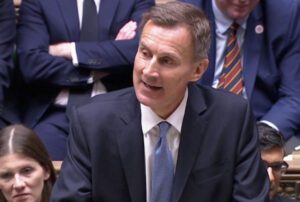We must not forget the lessons of our financial crisis, warns Jeremy Hunt

<?xml encoding=”utf-8″ ??>
The government will not reverse post-financial crisis banking regulation, Jeremy Hunt has said, amid growing concerns that Britain is loosening post-Brexit rules for the City.
The chancellor told the Commons’ Treasury select committee that a decision on whether to relax the ring-fencing between banks’ retail divisions and their riskier investment banking businesses would be made with the aim of preserving financial stability.
“We think that 15 years after the financial crisis, it is the right time to review the ring-fencing regime. But we are also clear we will not unlearn the lessons of the financial crisis and we will make sure we build on the fact that our regulators have a responsibility to promote financial stability,” Hunt said.
Ring-fencing was implemented in 2019 and requires large banks to hold cash reserves to protect their retail customers from shocks or losses emerging in riskier parts of the firms’ activities, such as investment banking.
Sir John Vickers, who helped to devise the rules after the financial crisis, has warned the government not to loosen regulation at a time when global bank stocks have fallen in the wake of the collapses of three American lenders and the forced sale of Credit Suisse.
The government has asked for more evidence on whether rules to wind down a bank in the event of a collapse were strong enough to replace the ring-fencing regime. The suggestion was made by Sir Keith Skeoch, who carried out a two-year review for the Treasury.
The chancellor said that evaluating the evidence would conclude shortly, with a final decision likely this summer. Changes to the rules are part of the government’s “Edinburgh reforms” to forge a more competitive financial services sector after Brexit.
“We will bring our plans forward shortly, but the reassurance I want to give everyone is that we will not unlearn lessons from the financial crisis and turn the clock back,” Hunt said.
Sam Woods, deputy governor at the Bank of England and head of the Prudential Regulation Authority, warned this week against changes that would fundamentally weaken the regime. He told MPs that so-called resolution rules to wind down banks were not a substitute for ring-fencing but were part of a package of post-crisis regulation designed to limit costs to the taxpayer for bank failure.
“With all of these experiences — Silicon Valley Bank and Credit Suisse — it’s been very clear to me that you would not want to rely on any one tool. You need to have various things, ring-fencing, bail-in and private sector purchases to go into [a bank resolution].”
Andrew Bailey, governor of the Bank and a former head of the PRA, also warned that ring-fencing and bank failure rules “were complements, not alternatives”.
Global regulators have been reluctant in recent weeks to use tougher bank resolution regimes to wind down crisis-hit lenders. Swiss authorities opted to push through a forced sale of Credit Suisse to UBS; US authorities provided a blanket guarantee of all deposits before winding down three banks; Silicon Valley Bank UK was rescued by a £1 purchase by HSBC.




